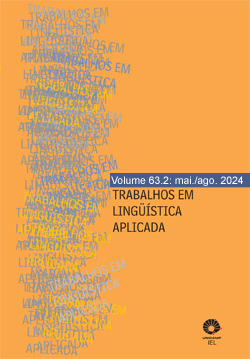Abstract
In spite of growing scholarship addressing emotions in Applied Linguistics, little research has focused on emotional issues of language teacher educators. In this article, we present the results of a qualitative study investigating the perspectives of such educators (from two public universities in Brazil) regarding their work routines, wellbeing and quality of life in their workspaces. Data were generated through questionnaires and interviews with 18 and 13 participants, respectively. Results point to three major themes: a) how the university workspace is imagined, and what is often said/unsaid about it; b) time-based identities; and c) relations between agency, guilt and pleasure.
References
AHMED, S. (2004). The cultural politics of emotion. Edimburgo: Edinburgh University Press.
ARAGÃO, R. (2022). A systemic view on emotion and reflection in language teacher education research. RBLA, v. 22, n. 1, p. 270-299.
ARAGÃO, R. (2006). Emoções e pesquisa narrativa: transformando experiências de aprendizagem. RBLA, v. 8, n. 2, p. 295-320.
BARCELOS, A. (2015). Unveiling the relationship between language learning beliefs, emotions, and identities. Studies In Second Language Learning And Teaching, v. 5, n. 2, p. 301-325.
BARCELOS, A.; ARAGÃO, R.; RUOHOTIE-LYHTY, M.; GOMES, G. (2022). Contemporary perspectives on research about emotions in language teaching. RBLA, v. 22, n.1, p. 1-16.
BENESCH, S. (2012). Considering emotions in critical English language teaching. Londres: Routledge.
BLOCH, C. (2012). Passion and paranoia: emotions and the culture of emotion in academia. Londres: routledge.
CANAGARAJAH, S. (2018). Translingual practice as spatial repertoires: expanding the paradigm beyond structuralist orientations. Applied Linguistics, v. 39, n. 1, p. 55-77.
DAMÁSIO, A. (2018). A estranha ordem das coisas: as origens biológicas dos sentimentos e da cultura. Trad. Laura Motta. São Paulo: Companhia das Letras.
FINARDI, K. (2022). As línguas e rankings no oscar da internacionalização das produções científicas latino-americanas. Estudos Linguísticos, v. 51, p. 147-161.
GEE, J. (2011). How to do discourse analysis: a toolkit. Londres: Routledge.
GOMES, G. (2022). Musing over the role of emotions to promote the exodus from the comfort zone in English language teaching and learning at a state university in Brazil. RBLA, v. 22, n. 1, p. 125-255.
KANNO, Y.; NORTON, B. (2003). Imagined communities and educational possibilities: introduction. Journal of Language, Identity, and Education, v. 2, n. 4, p. 241–249.
KRAMSCH, C. (2012). Imposture: A late modern notion in poststructuralist SLA research. Applied Linguistics, v. 33, n. 5, p. 483-502.
KRASHEN, S.; TERRELL, T. (1998). The natural approach: language acquisition in the classroom. Hertfordshire: Prentice Hall.
LA FORGE, P. (1971). Community language learning: a pilot study. Language Learning, v. 21, n. 1, p. 45-61.
MACINTYRE, P.; ROSS, J.; TALBOT, K.; MERCER, S.; GREGERSEN, T.; BANGA, C. (2019). Stressors, personality and wellbeing among language teachers. System, v. 82, p. 26-38.
MATURANA, H. (1998). Emoções e linguagem na educação e na política. Trad. José Fernando Campos Fortes. Belo Horizonte: Ed. UFMG.
NORTON, B. (2000). Identity and language learning: gender, ethnicity and educational change. Essex: Pearson.
NORTON, B.; TOOHEY, K. (2011). Identity, language learning, and social change. Language Teaching, v. 44, n. 4, p. 412-446.
OLIVEIRA, L; OLIVEIRA, A. (2022). Racialized emotions in language teaching: A case study with black female teachers. RBLA, v. 22, n.1, p. 37-67.
TALBOT, K.; MERCER, S. (2018). Exploring university ESL/EFL teachers’ emotional well-being and emotional regulation in the United States, Japan and Austria. Chinese Journal of Applied Linguistics, v. 41, n. 4, p. 410-432.
ZEMBYLAS, M. (2005). Discursive practices, genealogies, and emotional rules: a poststructuralist view on emotion and identity in teaching. Teaching and Teacher Education, v. 21, p. 935-948.

This work is licensed under a Creative Commons Attribution 4.0 International License.
Copyright (c) 2024 Eduardo Henrique Diniz de Figueiredo, Denise Kluge, Helena Stürmer


